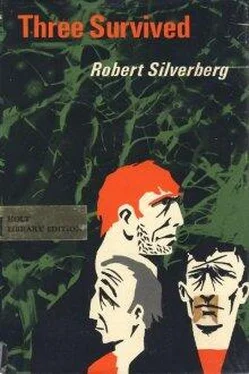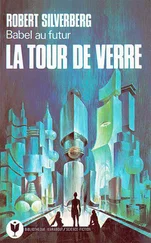Robert Silverberg - Three Survived
Здесь есть возможность читать онлайн «Robert Silverberg - Three Survived» весь текст электронной книги совершенно бесплатно (целиком полную версию без сокращений). В некоторых случаях можно слушать аудио, скачать через торрент в формате fb2 и присутствует краткое содержание. Год выпуска: 1969, ISBN: 1969, Издательство: Holt, Rinehart and Winston, Жанр: Фантастика и фэнтези, на английском языке. Описание произведения, (предисловие) а так же отзывы посетителей доступны на портале библиотеки ЛибКат.
- Название:Three Survived
- Автор:
- Издательство:Holt, Rinehart and Winston
- Жанр:
- Год:1969
- ISBN:0-03-076315-0
- Рейтинг книги:4 / 5. Голосов: 1
-
Избранное:Добавить в избранное
- Отзывы:
-
Ваша оценка:
- 80
- 1
- 2
- 3
- 4
- 5
Three Survived: краткое содержание, описание и аннотация
Предлагаем к чтению аннотацию, описание, краткое содержание или предисловие (зависит от того, что написал сам автор книги «Three Survived»). Если вы не нашли необходимую информацию о книге — напишите в комментариях, мы постараемся отыскать её.
Three Survived — читать онлайн бесплатно полную книгу (весь текст) целиком
Ниже представлен текст книги, разбитый по страницам. Система сохранения места последней прочитанной страницы, позволяет с удобством читать онлайн бесплатно книгу «Three Survived», без необходимости каждый раз заново искать на чём Вы остановились. Поставьте закладку, и сможете в любой момент перейти на страницу, на которой закончили чтение.
Интервал:
Закладка:
Three Survived
by Robert Silverberg
Chapter 1
Tom Rand was in his cabin when the spaceship blew its overdrive. One moment he was standing next to his bunk, looking over some work he was doing. The next moment he was flat on his face, wondering what was going on.
He shook the grogginess out of his skull and sat up. He heard alarm sirens wailing. Signal lights flashed on the cabin wall. DANGER! DANGER!
The other lights in the cabin faded. Then they came on again, much brighter than before. And faded. And got bright again. And faded once more.
The ship’s gravity went cockeyed next. Everything that wasn’t nailed down started to fly around. That included the passengers. Tom Rand felt himself rushing toward the ceiling. He reached up and let his arms take the shock of the collision.
Then the emergency gravity took control. Rand fell back to the floor. The lights stopped flickering.
But he knew that the ship’s troubles weren’t over. Its troubles were just beginning, and the big question was how bad the troubles were.
And the answer was, very bad.
A low humming sound came throbbing through the cabin wall. It grew higher and higher in pitch until it became a thin, sharp scream. Just when the sound was unbearable, it stopped. And the starship Clyde F. Bohmer came snapping out of special space with a jolt that made Tom Rand’s eyeballs jiggle.
We’ve had it, Rand thought.
We aren’t going to get home on this ship.
Things grew quiet for a moment. Rand picked himself off the floor and grabbed for his cabin phone. With shaky fingers he punched the INFO button.
“What happened?” he asked.
“We have suffered a failure in the main overdrive generator,” said the master computer’s calm voice. “The result has been total destruction of the front section from Compartments 10 through 14.”
“Are you saying that half the ship has blown up?”
“Not exactly half,” the computer replied. “In terms of the actual percentage of destruction, about 38 per cent of—”
“Never mind,” said Rand. “What shape is the overdrive unit in?”
“The overdrive unit is a complete loss. The voyage has been interrupted.”
“Interrupted? You bet!” Rand couldn’t bring himself to laugh at the computer’s choice of words.
If the overdrive was gone, the computer—the ship’s brain—would be the one to know. And if the overdrive was gone, there was no way they could reach Earth. They’d starve to death first.
Overdrive is what gets you from star to star without having to spend your whole life making the trip. A spaceship blasts off from a planet using ordinary rocket drive, but after a couple of days it switches to overdrive. The overdrive pushes the ship out of the regular universe and into special space.
You travel fast in special space. Instead of taking ten or twenty years to go from one star to another, you do it in two or three months. The universe is a big place, and overdrive is the only way to get around it in a hurry.
But a spaceship’s overdrive is a complicated gadget. Sometimes it decides to blow up, nobody knows why.
And when it does—
It had happened aboard the Clyde F. Bohmer, which was making a hop back to Earth from the distant planet Rigel IV. It had happened without warning, and it had happened fast. Now the ship had been knocked out of special space and crippled.
“What about casualties?” Rand asked.
The computer hummed for an instant. Usually it gave answers without a pause, but right now it had plenty of work to do in all parts of the ship. Rand, who was a space engineer by trade, couldn’t blame it if its timing was a little slow right now.
It said, “The air loss was serious in Compartments 8 and 9. Emergency walls are in place and new air supplies have been pumped in. Eight men are injured or dead there. The officers’ bridge was destroyed: no survivors known. Engine room destroyed: several survivors, condition serious. Some passengers unharmed although deaths have been observed. Radon clouds are causing dangers in lower levels of the ship. Lifeships 3, 7, 8 are ready for use. Some of the remaining lifeships are damaged and not in working order. Computer section functioning and—”
Rand put the phone down. He had heard what he needed to know.
Now he had to get into action.
The ship was a wreck. And of the 38 men who had been on board when they set out from Rigel IV, possibly 10 were still alive. And most of those weren’t in very good shape. Rand counted up the death roll:
Six officers, all of them dead.
Twelve passengers, “some unharmed,” according to the computer’s first report from the scanning pickups, but “deaths have been observed.”
There had been twenty crewmen. A dozen of them had been up front in the engine room. Most of them had probably been killed in the moment of the blowup. Probably all. The computer had said, “Several survivors, condition serious,” but maybe the computer was confused. Even computers could get confused when something as bad as this hit a ship. Those men had to be dead up there.
Eight other crewmen had been in Compartments 8 and 9. They hadn’t felt the full fury of the explosion. But those eight men had had a heavy dose of exposure to space before the emergency walls moved into position. They were as good as dead, Rand figured. Some of them might still be living, but not for long.
He decided that he was lucky to be alive.
Now what, though?
The only thing that made sense to do was to abandon ship. Get off it in a hurry, Rand thought, before something else blows up. Get off and head for the nearest planet where there might be a rescue signal beacon.
It was a waste of time even to think about making repairs. The ruined ship didn’t stand a comet’s chance of getting to Earth or anywhere else. With the overdrive gone, the Clyde F. Bohmer could only drift helplessly in space.
Rand knew where the lifeships were located. He was the kind of practical man who always checked out things like that when he boarded a spaceship.
There was a lifeship just up the passageway from his cabin.
First, though, he had to see what he could do for the other survivors. If there were any survivors.
He pushed open his cabin door and headed out into the passageway to have a look around.
Chapter 2
A hot cloud of oily gray smoke hit him in the face the moment he stepped out of his cabin. It stung his nostrils and made his eyes start to weep.
Radon, Rand thought in sudden fear.
He remembered that the computer had told him, “Radon clouds are causing dangers in lower levels of the ship.” Radon, a radioactive gas, set free somehow by the explosion in the overdrive generator—deadly poison in the passageways!
He flung his arm across his face and ducked back inside his cabin. Then his moment of panic passed. He was still alive; that meant he couldn’t have stepped into a radon cloud. If the smoke out there had been radon, he would be dead now. It was that simple.
Probably the radioactive gas was a danger only on the lower levels. That was what the computer had said. Rand realized that the computer would have taken steps to keep the radon from spreading up here to his part of the ship. Every level must be sealed now.
The smoky cloud in the passageway, then, was most likely plain old smoke, of the kind that the human race had known for a million years. That was better than having radon out there. But it still wasn’t good news. It told him that the ship was now on fire, along with all its other troubles.
He had to go out there, though. He opened his door a second time and forced himself into the dense wall of thick smoke.
Читать дальшеИнтервал:
Закладка:
Похожие книги на «Three Survived»
Представляем Вашему вниманию похожие книги на «Three Survived» списком для выбора. Мы отобрали схожую по названию и смыслу литературу в надежде предоставить читателям больше вариантов отыскать новые, интересные, ещё непрочитанные произведения.
Обсуждение, отзывы о книге «Three Survived» и просто собственные мнения читателей. Оставьте ваши комментарии, напишите, что Вы думаете о произведении, его смысле или главных героях. Укажите что конкретно понравилось, а что нет, и почему Вы так считаете.












